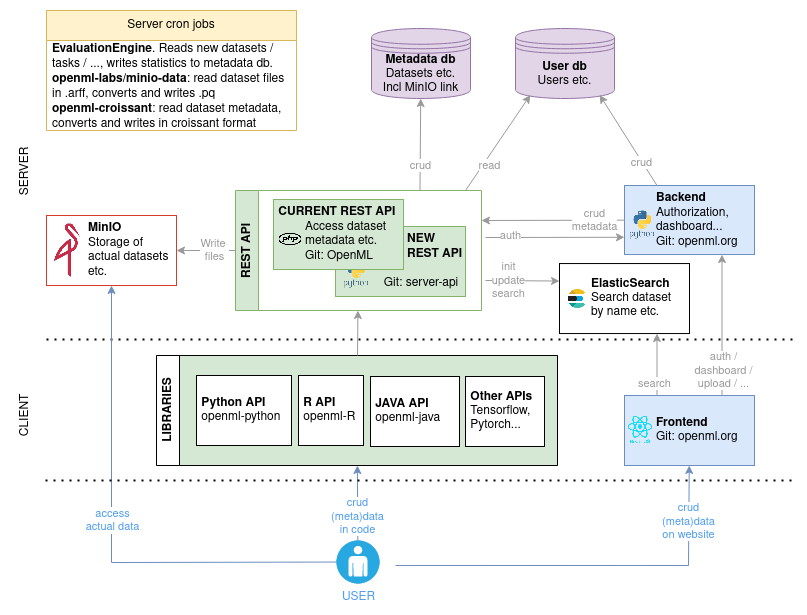Overview of all OpenML components including a docker-compose to run OpenML services locally
- Linux/MacOS/Windows (should all work)
- Docker
- Docker Compose version 2.21.0 or higher
You run all OpenML services locally using
docker compose --profile all up -dStop it again using
docker compose --profile all downYou can use different profiles:
[no profile]: databases"elasticsearch": databases + elasticsearch"rest-api": databases + elasticsearch + REST API"frontend": databases + elasticsearch + REST API + frontend + email-server"minio": database + elasticsearch + REST APP + MinIO + parquet and croissant conversion"all": everything
Usage examples:
docker compose --profile all up -d # all services
docker compose up -d # only the database
docker compose --profile frontend up -d # Frontend, rest-api, elasticsearch and databaseUse the same profile for your down command.
See the Github Issue list for the known issues.
Some usefull commands:
docker logs openml-php-rest-api -f # tail the logs of the php rest api
docker exec -it openml-php-rest-api /bin/bash # go into the php rest api container
./scripts/connect_db.sql # access the databaseTip
If you change any port, make sure to change it for all services! The elasticsearch config, for instance, needs to know the port of the frontend (for CORS).
When you spin up the docker-compose, you'll get these endpoints:
- Frontend: localhost:5000
- Database: localhost:3306, filled with test data.
- ElasticSearch: localhost:9200, filled with test data.
- Rest API: localhost:8080
- Minio: console at localhost:9001, filled with test data.
The credentials for the database can be found in config/database/.env, for minio in config/minio/.env, etc.
The email-server is used for emails from the frontend. For example, if you create a new user, an
email is send to the user. All outgoing emails are rerouted to catchall@example.com. You can see
the messages in config/email-server/messages. Note that some of the urls in the emails need to
be slightly altered to use them in the test setup: change https to http.
If you want to do local development on containers that are part of the docker-compose, you want those containers to change based on your code. You should have the relevant code somewhere on your system, you only need to tell the docker-compose where to find it. You can do so by setting environment variables.
Create a .env file inside this directory, and set:
PHP_CODE_DIR=/path/to/OpenML # Root of https://github.com/openml/OpenML on your computer
PHP_CODE_VAR_WWW_OPENML=/var/www/openml # Always set this to /var/www/openml. Leave empty if you leave PHP_CODE_DIR emptyMake sure to create openml_OS/config/BASE_CONFIG.php in your local $PHP_CODE_DIR. The correct configuration can be found in config/php.env. Run docker compose with profile rest-api.
ARFF_TO_PQ_CODE_DIR=/path/to/minio-data # Root of https://github.com/openml-labs/minio-data on your computer
ARFF_TO_PQ_APP=/app # Always set this to /app. Leave empty if you leave ARFF_TO_PQ_CODE_DIR emptyCROISSANT_CODE_DIR=/path/to/openml-croissant/python # Python directory of https://github.com/openml/openml-croissant on your computer
CROISSANT_APP=/app # Always set this to /app. Leave empty if you leave CROISSANT_CODE_DIR emptyFRONTEND_CODE_DIR=/path/to/openml.org # Python directory of https://github.com/openml/openml.org on your computer
FRONTEND_APP=/app # Always set this to /app. Leave empty if you leave FRONTEND_CODE_DIR emptyIf you want to develop a service that depends on any of the services in this docker-compose, just bring up this docker-compose and point your service to the correct endpoints.
